新概念英语第1册
新概念英语第一册(中英文对照)
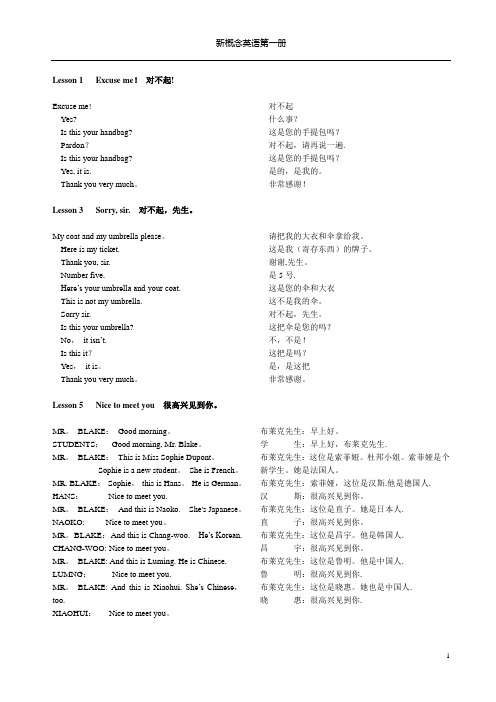
Lesson 1 Excuse me!对不起!Excuse me!Yes?Is this your handbag? Pardon?Is this your handbag? Yes, it is.Thank you very much。
对不起什么事?这是您的手提包吗?对不起,请再说一遍. 这是您的手提包吗?是的,是我的。
非常感谢!Lesson 3 Sorry, sir. 对不起,先生。
My coat and my umbrella please。
Here is my ticket.Thank you, sir.Number five.Here’s your umbrella and your coat. This is not my umbrella.Sorry sir.Is this your umbrella?No,it isn’t.Is this it?Yes,it is。
Thank you very much。
请把我的大衣和伞拿给我。
这是我(寄存东西)的牌子。
谢谢,先生。
是5号.这是您的伞和大衣这不是我的伞。
对不起,先生。
这把伞是您的吗?不,不是!这把是吗?是,是这把非常感谢。
Lesson 5 Nice to meet you 很高兴见到你。
MR。
BLAKE:Good morning。
STUDENTS:Good morning, Mr. Blake。
MR。
BLAKE:This is Miss Sophie Dupont。
Sophie is a new student。
She is French。
MR. BLAKE:Sophie,this is Hans。
He is German。
HANS:Nice to meet you.MR。
BLAKE:And this is Naoko. She's Japanese。
NAOKO: Nice to meet you。
MR。
BLAKE:And this is Chang-woo. He’s Korean. CHANG-WOO: Nice to meet you。
新概念英语1册 课文 完整版
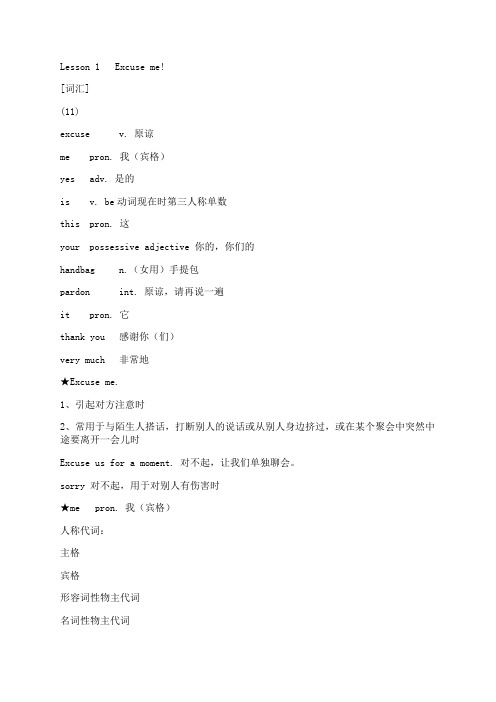
Lesson 1 Excuse meexcuse v. 原谅me pron. 我(宾格)yes adv. 是的is v. be动词现在时第三人称单数this pron. 这your possessive adjective 你的,你们的handbag n.(女用)手提包pardon int. 原谅,请再说一遍it pron. 它thank you 感谢你(们)very much 非常地★Excuse me.1、引起对方注意时2、常用于与陌生人搭话,打断别人的说话或从别人身边挤过,或在某个聚会中突然中途要离开一会儿时Excuse us for a moment. 对不起,让我们单独聊会。
sorry 对不起,用于对别人有伤害时★me pron. 我(宾格)人称代词:主格宾格形容词性物主代词名词性物主代词Imemyminehehimhishissheherherhersitititsitsyouyouyouryours主格:用在句首,作主语宾格:在动词、介词之后形容词性的物主代词:不能单独使用名词性物主代词:只能单独使用★is v. be动词现在时第三人称单数be动词:am、is、areI amshe/ he/ it isyou/ we/ they are★pardon int. 原谅,请再说一遍Pardon?/ I beg your pardon. 请求对方把刚才讲过的话重复一遍。
[语法]含有be动词的陈述句、否定句和一般疑问句含有be动词的任何句子,否定句就是在be动词后面加not;如果变一般疑问句,就把be动词提前到句子的前面。
[课文]Excuse me.Yes?Is this your handbag?Pardon?Is this your handbag?Yes, it is.Thank you very much.Lesson 2 Is this your…?[词汇](10)pen n.钢笔pencil n.铅笔book n.书watch n.手表coat n.上衣,外衣dress n.连衣裙skirt n.裙子shirt n.衬衣car n.小汽车house n.房子★dress① n. 连衣裙;套裙② n. 服装,衣服casual dress 便服evening dress 晚礼服★house n.房子house 房子,一般指独立的院落,更具体的指房子的建筑,结构family 侧重家庭的成员There are four people in my family. 在我家里有四口人。
(完整)新概念英语第一册详细讲解
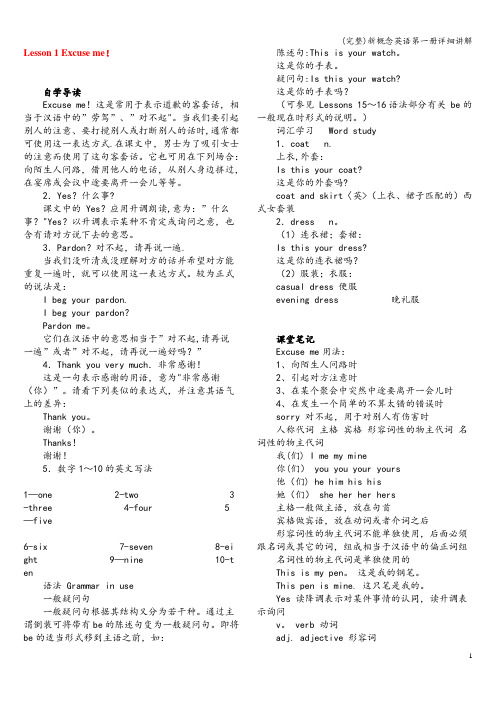
Lesson 1 Excuse me!自学导读Excuse me!这是常用于表示道歉的客套话,相当于汉语中的”劳驾”、”对不起"。
当我们要引起别人的注意、要打搅别人或打断别人的话时,通常都可使用这一表达方式.在课文中,男士为了吸引女士的注意而使用了这句客套话。
它也可用在下列场合:向陌生人问路,借用他人的电话,从别人身边挤过,在宴席或会议中途要离开一会儿等等。
2.Yes?什么事?课文中的 Yes?应用升调朗读,意为:”什么事?"Yes?以升调表示某种不肯定或询问之意,也含有请对方说下去的意思。
3.Pardon?对不起,请再说一遍.当我们没听清或没理解对方的话并希望对方能重复一遍时,就可以使用这一表达方式。
较为正式的说法是:I beg your pardon.I beg your pardon?Pardon me。
它们在汉语中的意思相当于”对不起,请再说一遍”或者”对不起,请再说一遍好吗?”4.Thank you very much.非常感谢!这是一句表示感谢的用语,意为"非常感谢(你)”。
请看下列类似的表达式,并注意其语气上的差异:Thank you。
谢谢(你)。
Thanks!谢谢!5.数字1~10的英文写法1—one 2-two 3 -three 4-four 5—five6-six 7-seven 8-ei ght 9—nine 10-t en语法 Grammar in use一般疑问句一般疑问句根据其结构又分为若干种。
通过主谓倒装可将带有be的陈述句变为一般疑问句。
即将be的适当形式移到主语之前,如:陈述句:This is your watch。
这是你的手表。
疑问句:Is this your watch?这是你的手表吗?(可参见 Lessons 15~16语法部分有关 be的一般现在时形式的说明。
)词汇学习 Word study1.coat n.上衣,外套:Is this your coat?这是你的外套吗?coat and skirt〈英>(上衣、裙子匹配的)西式女套装2.dress n。
新版新概念英语第一册课文文档
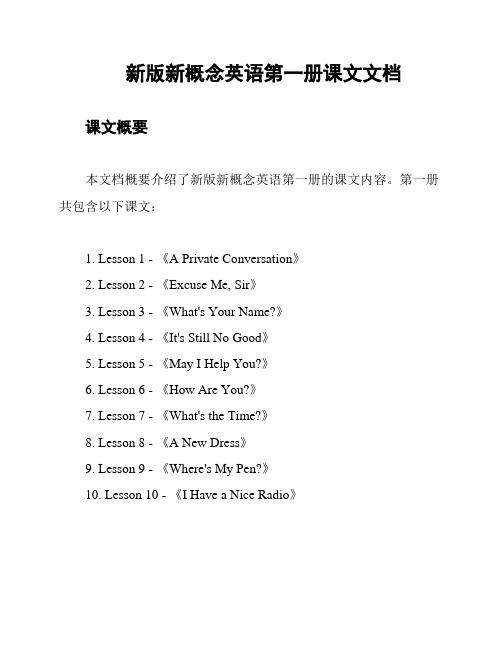
新版新概念英语第一册课文文档课文概要本文档概要介绍了新版新概念英语第一册的课文内容。
第一册共包含以下课文:1. Lesson 1 - 《A Private Conversation》2. Lesson 2 - 《Excuse Me, Sir》3. Lesson 3 - 《What's Your Name?》4. Lesson 4 - 《It's Still No Good》5. Lesson 5 - 《May I Help You?》6. Lesson 6 - 《How Are You?》7. Lesson 7 - 《What's the Time?》8. Lesson 8 - 《A New Dress》9. Lesson 9 - 《Where's My Pen?》10. Lesson 10 - 《I Have a Nice Radio》每课文都包含了一段对话,帮助学生练实际的英语会话。
这些课文涵盖了常见的日常交流场景,旨在帮助学生提高英语口语和听力技能。
除了对话内容,课文还包括了生词和重点词汇,并提供了中文翻译以帮助学生理解。
课文后面还有一些练题,帮助学生巩固所学知识。
使用方法学生可以按照课文的顺序逐一研究。
建议先阅读课文,理解对话内容和词汇意思。
然后,尝试模仿对话中的句子和表达方式,加强口语练。
最后,完成课后练题,检验自己对课文的理解和掌握程度。
建议学生在研究过程中积极参与口语练,可以与同学、朋友或老师进行日常对话练,帮助提高口语表达能力。
研究目标通过研究新版新概念英语第一册的课文,学生将能够:1. 掌握常用的日常交流用语和表达方式。
2. 提高英语听力和口语能力。
3. 增加词汇量,理解并使用生词和重点词汇。
4. 加强对英语语法和句型的理解。
5. 培养研究英语的兴趣和自信心。
参考资料为了更好地研究本课程,建议学生配合使用以下参考资料:1. 《新版新概念英语第一册教材》 - 课文详细内容和练题。
新概念英语第一册12篇
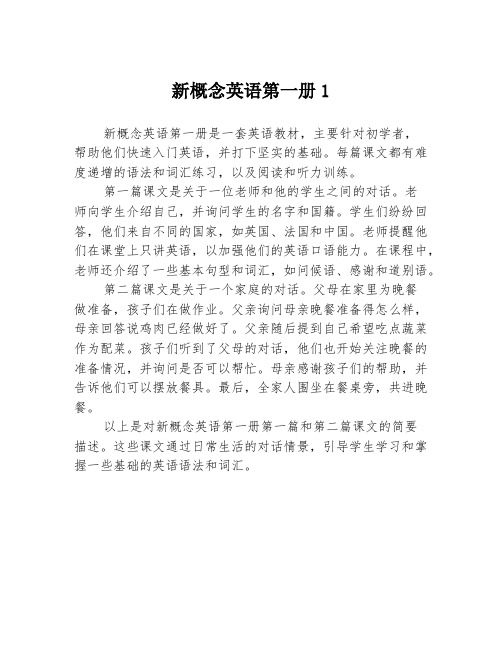
新概念英语第一册1
新概念英语第一册是一套英语教材,主要针对初学者,
帮助他们快速入门英语,并打下坚实的基础。
每篇课文都有难度递增的语法和词汇练习,以及阅读和听力训练。
第一篇课文是关于一位老师和他的学生之间的对话。
老
师向学生介绍自己,并询问学生的名字和国籍。
学生们纷纷回答,他们来自不同的国家,如英国、法国和中国。
老师提醒他们在课堂上只讲英语,以加强他们的英语口语能力。
在课程中,老师还介绍了一些基本句型和词汇,如问候语、感谢和道别语。
第二篇课文是关于一个家庭的对话。
父母在家里为晚餐
做准备,孩子们在做作业。
父亲询问母亲晚餐准备得怎么样,母亲回答说鸡肉已经做好了。
父亲随后提到自己希望吃点蔬菜作为配菜。
孩子们听到了父母的对话,他们也开始关注晚餐的准备情况,并询问是否可以帮忙。
母亲感谢孩子们的帮助,并告诉他们可以摆放餐具。
最后,全家人围坐在餐桌旁,共进晚餐。
以上是对新概念英语第一册第一篇和第二篇课文的简要
描述。
这些课文通过日常生活的对话情景,引导学生学习和掌握一些基础的英语语法和词汇。
新概念英语第一册(完整版)

Lesson1: Excuse me!Excuse me!Yes?Is this your handbag?Pardon?Is this your handbag?Yes, it is.Thank you very much.Lesson 3:Sorry sir.My coat and my umbrella please. Here is my ticket.Thank you sir.Number five.Here is your umbrella and your coat. This is not my umbrella.Sorry sir.Is this your umbrella?No, it isn't.Is this it?Yes, it is.Thank you very much.Lesson 5: Nice to meet you.Good morning.Good morning, Mr. Blake.This is Miss Sophie Dupont.Sophie is a new student.She is a French.Sophie, this is Hans.He is German.Nice to meet you.And this is Naoko.She’sJapanese.Nice to meet you.And this is Chang-woo.He’s Korean. (朝鲜人)Nice to meet you.And this is Luming.He’s Chinese.Nice to meet you.And this is Xiaohui.She’s Chinese, too.Nice to meet you.Lesson 7: Are you a teacher? I’m a new student.My name’s Robert.Nice to meet you.My name’s Sophie.Are you French?Yes, I’m.Are you French, too?No, I’m not.What nationality are you? I’m Italian.Are you a teacher?No, I’m not.What’s your job?I’m a keyboard operator. What’s your job?I’m an engineer.Lesson 9: How are you today? Hello, Helen.Hi, Steven.How are you today?I’m very well, Thank you. And you?I’m fine, thanks.How is Tony?He’s fine, Thanks.How’s Emma?She’s very well, too, Helen. Goodbye, Helen.Nice to see you.Nice to see you, too, Steven. Goodbye.Lesson 11: Is this your shirt? Whose shirt is that?Is this your shirt, Dave?No, sir.It’s not my shirt.This is my shirt.My shirt is blue.Is this shirt Tim’s? Perhaps it is, sir.Tim’s shirt is white.Tim!Yes, sir.Is this your shirt?Yes, Sir.Here you are.Catch.Thank you, sir.Lesson 13: A new dressWhat color is your new dress?It is green.Come upstairs and see it. Thanks you.Look!Here it is!That’s a nice dress.It’s very smart.My hat’s new, too.What color is it?It’s the same color.reen, too.It’s gThat’s a lovely hat.Lesson 15: Your passport, please. Are you Swedish?No, we are not.We are Danish.Are your friends Danish, too? No, they aren’t.They are Norwegian.Your passport, please.Here they are.Are there your cases?No, they aren’t.Our cases are brown.Here they are.Are you tourists?Yes, we are.Are your friends tourists too?Yes, they are.That’s fine.Thank you very much.Lesson 17: How do you doCome and meet our employees, Mr. Richards. Thank you, Mr. Jackson.This is Nicola Grey, and this is Claire Taylor. How do you do?Those women are very hard-working.What are their jobs?They’re keyboard operators.This is Michael Baker, and this is Jeremy Short. How do you do?They aren’t very busy!What are their jobs?They’re sales reps.They are very lazy.Who is this young man?This is Jim.He is our office assistant.Lesson 19: Tired and thirstyWhat’s the mater, children?We are tired and thirsty, Mum.Sit down here.Are you all right now?No, we aren’t.Look!There’s an ice cream man.Two ice creams please.Here you are, children.Thanks, Mum.These ice creams are nice.Are you all right now?Yes, we are, thank you.Lesson 21: Which book?Give me a book please, Jane.Which book?This one?No, not that one. The red one.This one?Yes, please.Here you are.Thank you.Lesson 23: Which glasses?Give me some glasses please, Jane.Which glasses?These glasses.No, not those. The ones on the shelf. These?Yes, please.Here you are.Thanks.Lesson25: Mrs. Smith’s kitchenMrs. Smith’s kitchen is small.There is a refrigerator in the kitchen.The refrigerator is white.It is on the right.There is an electric cooker in the kitchen. The cooker is blue.It is on the left.There is a table in the middle of the room. There is a bottle on the table.The bottle is empty.There is a cup on the table, too.The cup is clean.Lesson 27: Mrs. Smith’s living roomMrs. Smith’s living room is large.There is a television in the room.The television is near the window.There are some magazines on the television. There is a table in the room.There are some newspapers on the table. There are some armchairs in the room.The armchairs are near the table.There is a stereo in the room.The stereo is near the door.There are some books on the stereo.There are some pictures in the room.The pictures are on the wall.Lesson 29: Come in, Amy.Come in, Amy.Shut the door, please.This bedroom is very untidy.What must I do, Mrs. Jones?Open the window and air the room.Then put these clothes in the wardrobe.(衣橱)Then make the bed.Dust the dressing table.Then sweep the floor.Lesson31: Where’s Sally?Where’s Sally, Jack?She’s in the garden, Jane.What’s she doing?She’s sitting under the tree.Is Tim in the garden, too?Yes, he is.He’s climbing the tree.I beg your pardon?Who’s climbing the tree.Tim is.What about the dog?The dog’s in the garden, too.It’s running across the grass.It’s running after a cat.Lesson 33: A fine dayIt’s a fine day today.There are some clouds in the sky, but the sun is shining. Mrs. Jones’s with his family.They are walking over the bridge.There are some boats on the river.Mrs. Jones and his wife are looking at them.Sally is looking at a big ship.The ship is going under the bridge.Tim is looking at an aeroplane.The aeroplane is flying over the river.Lesson 35: Our villageThis is a photograph of our village.Our village is in a valley.It is between two hills.The village is on a river.Here is another photograph of the village.My wife and I are walking alone the banks of the river. We are on the left.There is a boy in the water.He is swimming across the river.Here is another photograph.This is the school building.It is beside a park.The park is on the right.Some children are coming out of the building.Some of them are going into the park.Lesson37: Making a bookcaseYou’re working hard, George.What are you doing?I’m making a bookcase.Give me that hammer please, Dan.Which hammer.This one?No, not that one.The big one.Here you are.Thanks, Dan.What are you going to do now, George?I’m going to paint it.What colour are you going to paint it?I’m going to paint it pink.Pink!This bookcase isn’t for me.It’s for my daughter, Susan.Pink’s her favorite colour.Lesson39: Don’t drop it!What are you going to do with that vase, Penny? I’m going to put it on this table, Sam. Don’t do that.Give it to me.What are you going to do with it?I’m going to put it here, in front of the window. Be careful.Don’t drop it!Don’t put it there, Sam.Put it here, on this shelf.There we are!It’s a lovely vase.Those flowers are lovely, too.Lesson41: Penny’s bagIs that bag heavy, Penny?Not very.Here!Put it on this chair.What’s in it?A piece of cheese.A loaf of bread.A bar of soap.A bar of chocolate.A bottle of milk.A pound of sugar.Half a pound of coffee.A quarter of a pound of tea.And a tin of tobacco.Is that tin of tobacco for me?Well, it’s certainly not for me!Lesson43: Hurry up!Can you make the tea, Sam?Yes, of course I can, Penny.Is there any water in this kettle(水壶)?Yes, there is.Where’s the tea?It’s over there, behind the teapot.Can you see it?I can see the teapot, but I can’t see the tea.There it is!It’s in front of you.Ah yes, I can see it now.Where are the cups?There are some in the cupboard(碗橱).Can you find them?Yes. Here they are.Hurry up, Sam.The kettle’s boiling.lesson45THE BOSS: Can you come here a minute please, Bob?Bob: Yes, sir?THE BOSS: Where's Miss Jones?Bob: She's next door. She's in her office, sir.THE BOSS: Can she type this letter for me? Ask her please.Bob: Yes, sir.Bob: Can you type this letter for the boss please, Miss Jones? MISS JONES: Yes, of course I can.Bob: Here you are.MISS JONES: Thank you, Bob.MISS JONES: Bob!Bob: Yes? What's the matter?MISS JONES: I can't type this letter.Miss Jones: I can't read it! The boss's handwriting is terrible!lesson47 A cup of coffeeMRS YOUNG: Do you like coffee, Mrs Price?MRS PRICE: Yes, I do.MRS YOUNG: Do you want a cup?MRS PRICE: Yes, please. Mrs Young.MRS YOUNG: Do you want any sugar?MRS PRICE: Yes, please.MRS YOUNG: Do you want any milk?MRS PRICE: No, thank you. I don't like milk in my coffee.I like black coffee.MRS YOUNG: Do you like biscuits?MRS PRICE: Yes, I do.MRS YOUNG: Do you want one?MRS PRICE: Yes, please.lesson49 At the butcher’sBUTCHER: Do you want any meat today, Mrs Bird?MRS BIRD: Yes, please.BUTCHER: This lamb's very good.MRS BIRD: I like lamb, but my husband doesn't .BUTCHER: What about some steak? This is a nice piece.MRS BIRD: Give me that piece please.BUTCHER: Do you want a chicken, Mrs Bird? They're very nice.MRS BIRD: No, thank you.MRS BIRD: My husband likes steak, but he doesn't like chicken. BUTCHER: To tell you the truth(说实在的), Mrs. Bird, I don't like chicken, either !lesson51 A pleasant climateHANS: Where do you come from?DIMITRI: I come from Greece.HANS: What's the climate like in your country?DIMITRI: It's very pleasant.Hans: What's the weather like in spring?DIMITRI: It's often windy in March. It's always warm in April and May, but it rains sometimes.HANS: What's it like in summer?DIMITRI: It's always hot in June, July and August. The sun shines every day.HANS: Is it cold or warm in autumn?DIMITRI: It's always warm in September and October. It's often cold in November and it rains sometimes.HANS: Is it very cold in winter?DIMITRI: It's often cold in December, January and February. It snows sometimes.lesson53 An interesting climateHANS: Where do you come from?JIM: I come from England.HANS: What's the climate like in your country?Jim: It's mild(温和的), but it's not always pleasant.Jim: The weather's often cold in the North and windy in the East. It's often wet in the West and sometimes warm in the South.Hans: Which seasons do you like best?Jim: I like spring and summer. The days are long and the nights are short. The sun rises early and sets late. I don't like autumn andwinter. The days are short and the nights are long. The sun riseslate and sets early. Our climate is not very good, but it's certainlyinteresting. It's our favorite subject of conversation.lesson55 The Sawyer familyThe Sawyers live at 87 King Street.In the morning, Mrs Sawyer goes to work and the children go to school. Their father takes them to school every day.Mrs Sawyer stays at home every day. She does the housework. She always eats her lunch at noon.In the afternoon, she usually sees her friends. They often drink tea together.In the evening, the children come home from school. They arrive home early.Mr Sawyer comes home from work. He arrives home late.At night, the children always do their homework. Then they go to bed. Mr Sawyer usually reads his newspaper, but sometimes he and his wife watch television.lesson57 An unusual dayIt is eight o'clock. The children go to school by car every day, but today, they are going to school on foot.It is ten o'clock. Mrs Sawyer usually stays at home in the morning, but this morning, she is going to the shops.afternoon, Mrs Sawyer usually drinks tea in the living-room, It is four o’clock. In thebut this afternoon, she is drinking tea in the garden.It is six o’clock. In the evening, the children usually do their homework, but this evening, they are not doing their homework. At the moment, they are playing in the garden.It is nine o’clock, Mr. Sawyer usually reads his newspaper at night, but he is not reading his newspaper tonight. At the moment, he is reading an interesting book.lesson59 Is that all?LADY: I want some envelopes please.STATIONER: Do you want the large size, or the small size?LADY: The large size please.LADY: Have you any writing-paper(信纸)?Stationer: Yes, we do.Stationer: I haven't any small pads. I only have large ones. Do you want a pad (便签簿)?LADY: Yes, please.LADY: And I want some black ink and some glue.Stationer: A bottler of ink and a bottle of glue.LADY: And I want a large box of chalk, too.Stationer: I only have small boxes. Do you want one?LADY: No, thank you.Stationer: Is that all?LADY: That's all, thank you.Stationer: What else do you want?LADY: I want my change.lesson61MR WILLIANMS: Where's Jimmy?MRS WILLIAMS: He's in bed.MR WILLIAMS: What's the matter with him?MRS WILLIAMS: He feels ill.MR WILLIAMS: He looks ill.MRS WILLIAMS: We must call the doctor.MR WILLIAMS: Yes, we must.MR WILLIAMS: Can you remember the doctor's telephone number?MRS WILLIAMS: Yes. It's 09754.DOCTOR: Open your mouth, Jimmy. Show me your tongue. Say, 'Ah'.MR WILLIMAMS: What's the matter with him, doctor?DOCTOR: He has a bad cold, M r Williams, so he must stay in bed for a week.MRS WILLIAMS: That's good news for Jimmy.DOCTOR: Good news? Why?MR WILLIAMS: Because he doesn't like school!lesson63 Thank you , doctor.DOCTOR: How's Jimmy today?MRS WILLIAMS: He's better , thank you, doctor.DOCTOR: Can I see him please, Mrs Williams?MRS WILLIAMS: Certainly, doctor. Come upstairs.DOCTOR: You look very well, Jimmy. You are better now, but you mustn'tget up yet.You must stay in bed for another two days.DOCTOR: The boy mustn't go to school yet, Mrs Williams. And he mustn't eat rich food.Mrs Williams: Does he have a temperature, doctor?Doctor: No, he doesn’t.MRS WILLIAMS: Must he stay in bed?DOCTOR: Yes. He must remain in bed for another two days. He can get up for about two hours each day, but you must keep the room warm. DOCTOR: Where's Mr Williams this evening?MRS WILLIAMS: He's in bed, doctor.Can you see him, please? He has a bad cold, too!lesson65 Not a babyFATHER: What are you going to do this evening, Betty?Betty: I'm going to meet some friends, Dad.FATHER: You mustn't come home late. You must be home at half past ten. BETTY: I can’t get home so early, Dad.Can I have the key to the front door, please?FATHER: NO, you can't.MOTHER: Betty's eighteen years old, Tom. She's not a baby. Give her the key.She always comes home early.FATHER: Oh, all right!FATHER: Here you are. But you mustn't come home after a quarter past eleven.Do you hear?BETTY: Yes, Dad.BETTY: Thanks, Mum.MOTHER: That's all right. Goodbye. Enjoy yourself!BETTY: We always enjoy ourselves, Mum. Bye, bye.lesson67 The weekendMRS JOHNSON: Hello, Mrs Williams. Were you at the butcher's?MRS WILLIAMS: Yes. I was. Were you at t he butcher’s ,too?How’sMRS JOHNSON: No, I wasn’t. I was at the greengrocer’s.Jimmy today?MRS WILLIAMS: He’s very well, thank you.MRS JOHNSON: Was he absent from school last week?MRS WILLIAMS: Yes, he was. He was absent on Monday, Tuesday,(你们身体Wednesday and Thursday. How are you all keeping?怎么样?)MRS JOHNSON: Very well, thank you. We’re going to spend three days in the-end.country. We’re going to stay at my mother’s for the week MRS WILLIAMS: Friday, Saturday and Sunday in the country! Aren’t youlucky!Lesson69 The car raceThere is a car race near our town every year. In 1968, there was a very big race.There were hundreds of people there. My wife and I were at the race. Our friends,Julie and Jack were there, too. You can see us in the crowd. We are standing on theleft.There were twenty cars in the race. There were English cars, French cars, Germancars, Italian cars, American cars and Japanese cars.It was an exciting finish. The winner was Billy Stewart. He was in car number fifteen.Five other cars were just behind him.On the way home, my wife said to me, “Don’t drive so quickly! You’re not BillyStewart!”Lesson 71 He’s awfulJane : What’s Ron Marston like , Pauline ?Pauline : He’s awful ! He telephoned me four times yesterday , and three times the day before yesterday.Pauline: He telephoned the office yesterday morning and yesterday afternoon. My boss answered the telephone .Jane : What did your boss say to him ?Pauline: He said ,”Miss White is typing letters .She can’t speak to you now !Pauline : Then I arrived home at six o’clock yesterday evening .He telephoned again .But I didn’t answer the phone !Jane : Did he telephone again last night ?Pauline : Yes , he did . He telephoned at nine o’clock .Jane : What did you say to him ?Pauline : I said ,”This is Pauline ‘s mother . Please don’t telephone my daughteragain !” Jane : Did he telephone again ?Pauline : No , he didn’t !Lesson73 The way to King StreetLast week Mrs Mills went to London. She does not know London very well, and shelost her way.Suddenly, she saw a man near a bus-shop. “ I can ask him the way.” She said toherself.“Excuse me,” she said.“Can you t ell me the way to King Street please?”The man smiled pleasantly. He did not understand English! He spoke German. Hewas a tourist.Then he put his hand into his pocket, and took out a phrase-book.He opened the book and found a phrase. He read the phrase slowly.“I am sorry,” he said. “ I do not speak English.”Lesson 75 Uncomfortable shoesLADY : Have you any shoes like these?SALESMAN: What size?Lady: Size five.Salesman: What colour?Lady: Black.Salesman: I’m sorry. We haven’t any.Lady: But my sister bought this pair last month.Salesman: Did she buy them here?Lady: No, she bought them in the U.S.Salesman: We had some shoes like those a month ago, but w e haven’t any now.Lady: Can you get a pair for me please?Salesman: I’m afraid that I can’t. They were in fashion last year and the yearbefore last.But they’re not in fashion this year.Salesman: These shoes are in fashion now.Lady: They look very uncomfortable.Salesman: They are very uncomfortable. But women always wear uncomfortableshoes!Lesson77 Terrible toothacheNurse: Good morning, Mr Croft.Mr Croft: Good morning, nurse. I want to see the dentist, please.Nurse: Have you an appointment?(有预约吗?)Mr Croft: No, I haven’t .Nurse: Is it urgent?Mr Croft: Yes, it is . It’s very urgent. I feel awful. I have a terrible toothache. Nurse: Can you come at 10 am on Monday, April 24th?Mr Croft: I must see the dentist now, nurse.Nurse: The dentist is very busy at the moment. Can you come at 2:00 PM?Mr Croft: That’s very late. Can’t the dentist see me now?Nurse: I’m afraid that he can’t , Mr Croft. Can’t you wait till this afternoon? Mr Croft: I can wait, but my toothache can’t !Lesson79 Peggy’s shopping-listTom: What are you doing, Peggy?-list, Tom.Peggy: I’m making a shoppingTom: What do we need?Peggy: We need a lot of things this week.We haven’t got much tea or coffee, and wePeggy: I must go to the grocer’s.haven’t got any sugar or jam.Tom: What about vegetables?many tomatoes, but we’ve Peggy: I must go to the greengrocer’s. We haven’t gotgot a lot of potatoes.Peggy: I must go to the butcher’s, too. We need some meat. We haven’t got an meat at all.Tom: Have we got any beer and wine?Peggy: No, we haven’t. And I’m not going to get any!Tom: I hope that you’ve got some money.Peggy: I haven’t got much.Tom: Well, I haven’t got much either!Lesson81 Roast beef and potato.John: Hello, Peggy! Where’s Tom?Peggy: He’s upstairs. He’s having a bath.Peggy: Tom!Tom: Yes?Peggy: John’s here.Tom: I’m nearly ready.Tom: Hello, John. Have a cigarette.John: No thanks, Tom.Tom: Have a glass of whisky then.John: O.K. Thanks.Tom: Is dinner ready, Peggy?Peggy: It’s nearly ready. We can have dinner at seven o’clock. Tom: John and I had lunch together today. We went to a restaurant.Peggy: What did you have?Tom: We had roast beef and potatoes.Peggy: Oh!Tom: What’s the matter, Peggy?Peggy: Well, you’re going to have roast beef and potatoes again tonight!Lesson83 Going on a holidayPeggy: Hello, John. Come in.Tom: Hello, John. We’re having lunch. Do you want to have lunch with us? John: No thank you, Tom. I’ve already had lunch. I had lunch at half past twelve. Peggy: Have a cup of coffee then.John: I’ve just had a cup, thank you. I had one after my lunch.Tom: Let’s go into the living-room, Peggy. We can have our coffee there. Peggy: Excuse the mess, John. This room’s very untidy. We’re packing our suitcases. W e’re g oing to leave tomorrow. Tom and I are going to have aholiday.John: Aren’t you lucky!Tom: When are you going to have a holiday, John?John: I don’t know. I’ve already had myholiday this year.Peggy: Where did you go?John: I stayed at home!Lesson85 Paris in the SpringGeorge: Hello, Ken.Ken: Hello, George.George: Have you just been to the cinema?Ken: Yes, I have.George: What’s on?Ken: “Paris in the Spring”.George: Oh, I’ve already seen it. I saw it on a B.B.C. television programme last year.It’s an old film, but it’s very good.Ken: Paris is a beautiful city.George: I have never been there. Have you ever been there, Ken?Ken: Yes, I have. I was there in April.George: Paris in the spring, eh?Ken: It was spring, but the weather was awful. It rained all the time.George: Just like dear old London!Lesson87 A car crashMr Wood: Is my car ready yet?Attendant: I don’t know, sir.What’s the licence number of your car?Mr Wood: It’s LFZ 312 G.Attendant: When did you bring it to us?Mr Wood: I bought it hear three days ago.Attendant: Ah yes, I remember now.Mr Wood: Have your mechanics finished yet?Attendant: No, they’re still working on it. Let’s go into the garage and have alook at it.Attendant: Isn’t that your car?Mr Wood: Well, it was my car.Attendant: Didn’t your wife have a crash?Mr Wood: That’s right. She drove it into a lamp post(电线杆). Can your mechanics repair it?Attendant: Well, they’re trying to repair it, sir. But to tell you the truth, you need a new car.Lesson89 For saleMr Hill: Good afternoon. I believe that this house is for sale(待售).Mr West: That’s right.Mr Hill: May I have a look at it please?Mr West: Yes, of course. Come in.Mr Hill: How long have you lived here?Mr West: I have lived here for twenty years.Mr Hill: Twenty years! That’s a long time.Mr West: Yes, I have been here since 1947.Mr Hill: Then why do you want to sell it?Mr West: Because I have just retired. I want to buy a small house in the country.Mr Hill: How much does this house cost?Mr West: £6850.Mr Hill: That’s a lot of money!Mr West: It’s worth every penny of it.st.Mr Hill: Well, I like the house, but I can’t decide yet. My wife must see it firMr West: Women always have the last word.Lesson91 Poor WestMrs Smith: Has Mr West sold his house yet?Mrs Brown: Yes, he has. He sold it last week.Mrs Smith: Has he moved to his new house yet?Mrs Brown: No, not yet. He’s still here. He’s going to move tomorrow.Mrs Smith: When? Tomorrow morning?Mrs Brown: No. Tomorrow afternoon. I’ll miss him. He has always been a good neighbour.Mrs Green: He’s a very nice person. We shall all miss him.Mrs Smith; When will the new people move into this house?Mrs Brown: I think that they will move in the day after tomorrow.Mrs Green: Will you see Mr West today, Mrs Brown?Mrs Brown: Yes, I will.Mrs Green: Please give him my regards. (give one’s regards to sb.向sb.问候)Mr Smith: Poor Mr West! He didn’t want to leave this house.Mrs Brown: No, he didn’t want to leave, but his wife did!Lesson93 Our new neighborMr Hill is our new next-door neighbour. He’s a pilot.He was in the R.A.F.(皇家空军)He will fly to New York next month.The month after next he will fly to Tokyo.At the moment(现在), he’s in Madrid. He flew to Spain a week ago.He will return to London the week after next.He’s only forty-one years old, and he has already been to nearly every country in theworld.Mr Hill is a very lucky man. But his wife isn’t very lucky. She usually stays at homeLesson95 Ticket, please.George: Two return tickets to London please. What time will the next trainleave?Attendant: At nineteen minutes past eight.George: Which platform?Attendant: Platform Two. Over the bridge.Ken: What time will the next train leave?George: At eight nineteen.Ken: We’ve got plenty of time.George: It’s only three minutes to eight.Ken: Let’s go and have a drink. There’s a bar next door to the station. George: We had better go back to the station now, Ken.Porter: Tickets please.George: We want to catch the eight nineteen to London.Porter: You’ve just missed it!George: What! It’s only eight fifteen.Porter: I’m sorry, sir. That clock’s ten minutes slow.George: When’s the next train?Porter: In five hours’ time!Lesson97 A small blue caseMr Hall: I left a suitcase on the train to London the other day.Attendant: Can you describe it, sir?Mr Hall: It’s a small blue case and it’s got a zip. There’s a label on the h with my name and address on it.Attendant: Is this case yours?Mr Hall: No, that’s not mine.Attendant: What about this one? This one’s got a label.Mr Hall: Let me see it.Attendant: What’s you name and address?Mr Hall: David Hall,83, Bridge Street.Attendant: That’s right.D.N.Hall.83.Bridge Street.Attendant: Three pound and fifty pence please.Mr Hall: Here you are.Attendant: Thank you.Mr Hall: Hey!Attendant: What’s the matter?Mr Hall: This case doesn’t belong to me! You’ve given me the wrong case!Lesson99 Ow!Ted : Ow!Pat: What’s the matter, Ted?Ted: I slipped and fell downstairs.Pat: Have you hurt yourself?Ted: Yes, I have. I think that I’ve hurt my back.Pat: Try and stand up. Can you stand up?Here. Let me help you.Ted: I’m sorry, Pat. I’m afraid that I can’t get up.Pat: I think that the doctor had better see you. I’ll telephone Dr Carter. Pat: The doctor says that he will come at once. I’m sure that you need an X-ray, Ted.Lesson101 A card from JimmyGrandmother: Read Jimmy’s card to me please, Mary.Mary: “I h ave just arrived in Scotland and I’m staying at a YouthHostel.”Grandmother: Eh?Mary: He says he’s just arrived inScotland.He says he’s staying at aYouth Hostel.of the Y.H.A.You know he’s a memberGrandmother: The what?Mary: The Y.H.A., mother. The Youth Hostel’s Association. Grandmother: What else does he say?Mary: “I’ll write a letter soon. I hope you are all well.”Grandmother: What? Speak up, Mary. I’m afraid I can’t hear you.Mary: He says he’ll write a letter soon. He hopes we are all well.Jimmy.”Grandmother: Is that all? He doesn’t say very much, does he?Mary: He can’t write very much on a card, mother.Lesson103 The Intelligence testHarry: How was the examination, Dick?Dick: Not too bad. I think I passed i n English and Mathematics. The questions were very easy. How about you, Harry?Harry: The English and Maths papers weren’t easy enough for me. I hope I haven failed.。
新概念第一册教案全册完整版

新概念第一册教案全册完整版一、教学内容1. Chapter 1: Excuse me!(对不起!)介绍日常用语,如问候、道歉、道别等。
基本语法:一般疑问句、否定句、一般现在时。
2. Chapter 2: Is this your?(这是你的吗?)学习如何描述物品和人物。
基本语法:一般现在时、一般疑问句、否定句。
3. Chapter 3: Thank you, madam.(谢谢,夫人。
)学习购物场景的日常用语。
基本语法:一般现在时、一般疑问句、否定句。
4. Chapter 4: What's the time?(现在几点?)学习时间表达法。
基本语法:一般现在时、一般疑问句、否定句。
5. Chapter 5: The Sawyer family.(索耶尔一家。
)学习家庭成员的称呼。
基本语法:一般现在时、一般疑问句、否定句。
二、教学目标1. 让学生掌握基本的日常英语用语,提高英语口语表达能力。
2. 使学生熟练运用一般现在时,形成正确的语法观念。
3. 培养学生用英语进行简单交流的能力。
三、教学难点与重点1. 教学难点:一般现在时、一般疑问句、否定句的运用。
2. 教学重点:日常英语用语的掌握。
四、教具与学具准备1. 教具:PPT、黑板、磁带、录音机。
2. 学具:教材、练习册、笔记本。
五、教学过程1. 导入:通过情景剧表演,让学生复习上一课的内容。
2. 新课内容:讲解本章重点单词、短语和句型。
3. 例题讲解:通过例题讲解,让学生理解语法点。
4. 随堂练习:让学生进行口头练习,巩固所学知识。
5. 小组活动:分组讨论,练习本章重点句型。
六、板书设计1. 重点单词、短语。
2. 重点句型。
七、作业设计1. 作业题目:(1)抄写本章重点单词、短语。
(2)用本章所学句型编写一段对话。
(3)完成练习册本章练习。
答案:见练习册答案。
八、课后反思及拓展延伸1. 反思:关注学生在课堂上的表现,及时发现问题,调整教学方法。
新概念英语第一册课文(全中文)

新概念英语第一册课文(全中文)新概念英语第一册课文(全中文)$课文1对不起!1对不起2什么事?3这是您的手提包吗?4对不起,请再说一遍。
5这是您的手提包吗?6是的,是我的。
7非常感谢!$课文3对不起,先生。
8请把我的大衣和伞拿给我。
9这是我(寄存东西)的牌子。
10谢谢,先生。
11是5号。
12这是您的伞和大衣13这不是我的伞。
14对不起,先生。
15这把伞是您的吗?16不,不是!17这把是吗?18是,是这把19非常感谢。
$课文5很高兴见到你。
20早上好。
21早上好,XXX先生。
22这位是XXX23XXX是个新学生。
24她是法国人。
25XXX,这位是XXX。
26他是德国人。
27很兴奋见到你。
28这位是直子。
29她是日本人。
30很高兴见到你。
31这位是XXX。
32他是韩国人。
33很高兴见到你。
34这位是XXX。
35他是中国人。
36很兴奋见到你。
37这位是XXX。
38她也是中国人。
39很兴奋见到你。
$课文7你是教师吗?40我是个新学生。
41我的名字叫XXX。
42很高兴见到你。
43我的名字叫XXX。
44你是法国人吗?45是的,我是法国人。
46你也是法国人吗?47不,我不是。
48你是哪国人?49我是意大利人。
50你是教师吗?51不,我不是。
52你是做甚么事情的?53我是电脑录入员。
54你是做什么工作的?55我是工程师。
$课文9今天好吗?56你好,XXX57你好,XXX58你今天好吗?59很好,谢谢你。
60你好吗?61很好,感谢。
62XXX好吗?63他很好,感谢。
XXX好吗?65她也很好,XXX。
66再会,XXX。
67见到你真高兴。
68我见到你也很兴奋,XXX再会。
$课文11这是你的衬衫吗?70那是谁的衬衫?71戴夫,这是你的衬衫吗?72不,先生。
73这不是我的衬衫。
74这是我的衬衫。
75我的衬衫是蓝色的。
76这件衬衫是XXX的吗?77也许是,先生。
78XXX的衬衫是白色的。
79XXX!80甚么事,师长教师。
81这是你的衬衫吗?82是的,先生。
新概念英语第一册课文(全中文)
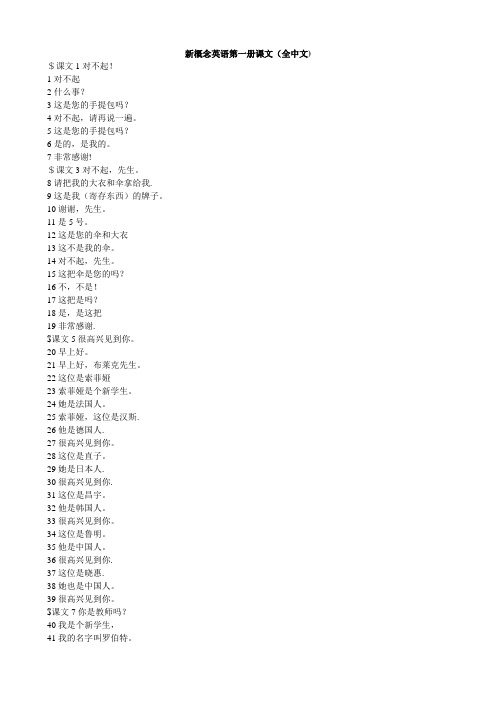
新概念英语第一册课文(全中文) $课文1对不起!1对不起2什么事?3这是您的手提包吗?4对不起,请再说一遍。
5这是您的手提包吗?6是的,是我的。
7非常感谢!$课文3对不起,先生。
8请把我的大衣和伞拿给我.9这是我(寄存东西)的牌子。
10谢谢,先生。
11是5号。
12这是您的伞和大衣13这不是我的伞。
14对不起,先生。
15这把伞是您的吗?16不,不是!17这把是吗?18是,是这把19非常感谢.$课文5很高兴见到你。
20早上好。
21早上好,布莱克先生。
22这位是索菲娅23索菲娅是个新学生。
24她是法国人。
25索菲娅,这位是汉斯.26他是德国人.27很高兴见到你。
28这位是直子。
29她是日本人.30很高兴见到你.31这位是昌宇。
32他是韩国人。
33很高兴见到你。
34这位是鲁明。
35他是中国人。
36很高兴见到你.37这位是晓惠.38她也是中国人。
39很高兴见到你。
$课文7你是教师吗?40我是个新学生,41我的名字叫罗伯特。
42很高兴见到你.43我的名字叫索菲娅.44你是法国人吗?45是的,我是法国人。
46你也是法国人吗?47不,我不是。
48你是哪国人?49我是意大利人。
50你是教师吗?51不,我不是。
52你是做什么工作的?53我是电脑录入员。
54你是做什么工作的?55我是工程师.$课文9今天好吗?56你好,海伦57你好,史蒂文58你今天好吗?59很好,谢谢你。
60你好吗?61很好,谢谢。
62托尼好吗?63他很好,谢谢。
64埃玛好吗?65她也很好,海伦。
66再见,海伦。
67见到你真高兴。
68我见到你也很高兴,史蒂文。
69再见。
$课文11这是你的衬衫吗?70那是谁的衬衫?71戴夫,这是你的衬衫吗?72不,先生.73这不是我的衬衫。
74这是我的衬衫。
75我的衬衫是蓝色的。
76这件衬衫是蒂姆的吗?77也许是,先生。
78蒂姆的衬衫是白色的。
79蒂姆!80什么事,先生。
81这是你的衬衫吗?82是的,先生。
83给你。
84接着!85谢谢您,先生。
新概念英语第一册1-30课主要内容

新概念英语第一册1——30课1——4课简单的问候,打招呼。
This is …句式及其一般疑问句式5——8课询问国籍和职业及车或某物品的牌子。
What’s your job?What nationality are you?What make is it ?am 、is 、are 的用法及练习he、she、it的用法9——12课询问身体状况的用语,fat、thin等形容词名词所有格已经用whose对名词所有格提问的问法。
Whose is this handbag? 同义句Whose handbag is this ?It’s her... handbag.(形容词性物主代词)It’s Stella......’.s..(名词所有格)对whose问句的回答应用名词所有格或物主代词。
13——16课对颜色的提问What colour is …?祈使句 Come upstairs and see it .单数名词变复数的规则以及变复数后“s”的发音规则。
17——20课对工作(多数人)的问法What are their jobs?另一部分名词复数的变法询问有什么麻烦有什么需要的问法What’s the matter ?What’s wrong with …同义句一部分形容词及be动词的练习21——24课形容词及厨房用品名词对定语的提问Which one ?(对单数提问)Which ones?(对复数提问)形容词性物主代词的用法人称代词宾格的写法及用法25——28课There be 句型对地点名词及表示方位的介词短语提问的用法Where is it ?Where are they ?重点练习There be句型There be(is、are)+名词+表示方位的介词短语一般疑问句把be动词(is、are)提前,some变any加问号29——30课祈使句的用法和结构情态动词must的用法What must I do ?。
新概念英语第一册1-30课主要内容

新概念英语第一册1——30课1——4课简单的问候,打招呼。
This is …句式及其一般疑问句式5——8课询问国籍和职业及车或某物品的牌子。
What’s your job?What nationality are you?What make is it ?am 、is 、are 的用法及练习he、she、it的用法9——12课询问身体状况的用语,fat、thin等形容词名词所有格已经用whose对名词所有格提问的问法。
Whose is this handbag? 同义句Whose handbag is this ?It’s her... handbag.(形容词性物主代词)It’s Stella......’.s..(名词所有格)对whose问句的回答应用名词所有格或物主代词。
13——16课对颜色的提问What colour is …?祈使句 Come upstairs and see it .单数名词变复数的规则以及变复数后“s”的发音规则。
17——20课对工作(多数人)的问法What are their jobs?另一部分名词复数的变法询问有什么麻烦有什么需要的问法What’s the matter ?What’s wrong with …同义句一部分形容词及be动词的练习21——24课形容词及厨房用品名词对定语的提问Which one ?(对单数提问)Which ones?(对复数提问)形容词性物主代词的用法人称代词宾格的写法及用法25——28课There be 句型对地点名词及表示方位的介词短语提问的用法Where is it ?Where are they ?重点练习There be句型There be(is、are)+名词+表示方位的介词短语一般疑问句把be动词(is、are)提前,some变any加问号29——30课祈使句的用法和结构情态动词must的用法What must I do ?。
(完整版)新概念英语第一册教材(中英文对照)
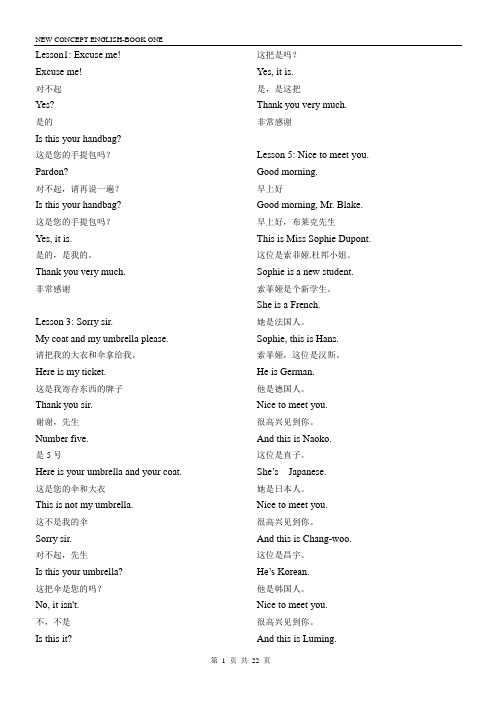
Lesson1: Excuse me!Excuse me!对不起Yes?是的Is this your handbag?这是您的手提包吗?Pardon?对不起,请再说一遍?Is this your handbag?这是您的手提包吗?Yes, it is.是的,是我的。
Thank you very much.非常感谢Lesson 3: Sorry sir.My coat and my umbrella please.请把我的大衣和伞拿给我。
Here is my ticket.这是我寄存东西的牌子Thank you sir.谢谢,先生Number five.是5号Here is your umbrella and your coat. 这是您的伞和大衣This is not my umbrella.这不是我的伞Sorry sir.对不起,先生Is this your umbrella?这把伞是您的吗?No, it isn't.不,不是Is this it? 这把是吗?Yes, it is.是,是这把Thank you very much.非常感谢Lesson 5: Nice to meet you. Good morning.早上好Good morning, Mr. Blake. 早上好,布莱克先生This is Miss Sophie Dupont. 这位是索菲娅.杜邦小姐。
Sophie is a new student.索菲娅是个新学生。
She is a French.她是法国人。
Sophie, this is Hans.索菲娅,这位是汉斯。
He is German.他是德国人。
Nice to meet you.很高兴见到你。
And this is Naoko.这位是直子。
She’s Japanese.她是日本人。
Nice to meet you.很高兴见到你。
And this is Chang-woo.这位是昌宇。
新概念英语第一册_中英对照
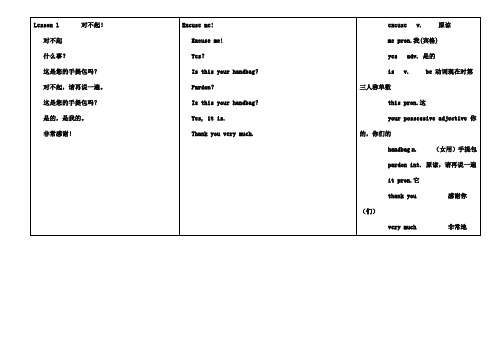
Lesson 51 宜人的气候汉斯:你是哪国人?迪米特里:我是希腊人。
汉斯:你们的国家的气候是怎么样?迪米特里:气候非常宜人。
汉斯:春季的天气怎么样?迪米特里:3月里常常刮风。
4月和5月的天气总暖洋洋的,但有时下雨。
汉斯:夏季的天气如何呢?迪米特里:6月7月和8月的天气总是炎热的每天都出太阳。
汉斯:秋季的天气是冷还是暖呢?迪米特里:9月和10月总是很暖和,11月常常就冷了,而且有时下雨。
汉斯:冬季的天气很冷吗?迪米特里:12月、1月和2月常常很冷,有时还下雪。
A pleasant climateHANS: Where do you come from?DIMITRI: I come from Greece.HANS: What's the climate like in your country?DIMITRI: It's very pleasant.HANS: What's the weather like in spring?DIMITRI: It's often windy in March.It's always warm in April and May, butit rains sometimes.HANS: What's it like in summer?DIMITRI: It's always hot in June, July and August.The sun shines every day.HANS: Is it cold or warm in autumn?DIMITRI: It's always warm in September and October.It's often cold in November and it rainssometimes.HANS: Is it very cold in winter?DIMITRI: It's often cold in December, January andFebruary.It snows sometimes.greece n. 希腊climate n. 气候country n. 国家pleasant adj. 宜人的weather n. 天气spring n. 春季windy adj. 有风的warm adj. 温暖的rain v. 下雨sometimes adv. 有时summer n. 夏天autumn n. 秋天winter n. 冬天snow v. 下雪January n. 1月February n. 2月March n. 3月April n. 4月May n. 5月June n. 6月July n. 7月August n. 8月。
新概念英语第一册详细讲解

新概念英语第一册详细讲解一、课程概述《新概念英语》共分为四册,是英语学习教材经典之作。
其中,第一册主要介绍英语基础知识和语法,帮助初学者打下坚实的语言基础。
本篇文档将着重讲解第一册的内容。
该教材由贝尔出版社于1963 年出版,现已成为国内外英语学习者的热门教材,具有以下特点:1.内容简单易懂,适合初学者;2.体系完整,包含课文、词汇、语法、阅读、听力、写作等多个方面;3.引用经典英文文章,提供很多英语原文阅读。
二、课程内容第一册《新概念英语》共分为 8 个单元,每个单元包含课文、语法、练习等多种内容。
下面我们就详细探讨一下每个单元的主要内容。
1. Unit 1Unit 1 着重介绍英语语言基础知识,主要包括:1.人称代词、名词性物主代词、动词 to be、一般现在时;2.国家、市承认、言语;3.英语 alphabet、数字、问候语。
2. Unit 2Unit 2 主要介绍英语语法,包含以下要点:1.一般疑问句、肯定回答、否定回答;2.介绍信息、介绍人、家庭成员;3.比较级、最高级。
3. Unit 3Unit 3 是本教材的重点,围绕复合式句展开。
内容包含:1.引导词,比如 after、although、because、before、if、since、so、when、while、while;2.过去式,包括一般过去式、过去进行时,以及它们的否定和疑问形式;3.介绍以昨天为时间的日常活动。
4. Unit 4Unit 4 侧重于英语基础词汇的学习,包含以下要点:1.介绍动词不定式、现在进行时、同构;2.基础英语词汇,如食物、动物、水果、科技等;3.介绍各个国家和地区的习俗、风景和人文历史。
5. Unit 5Unit 5 着重介绍英语语言语法,包含以下内容:1.特殊疑问句,包括 what、where、when、how、why;2.情态动词 can、may、must、should、will、would;3.介绍一些带有动词的短语。
(完整版)新版新概念英语第一册课文PDF(最新整理)
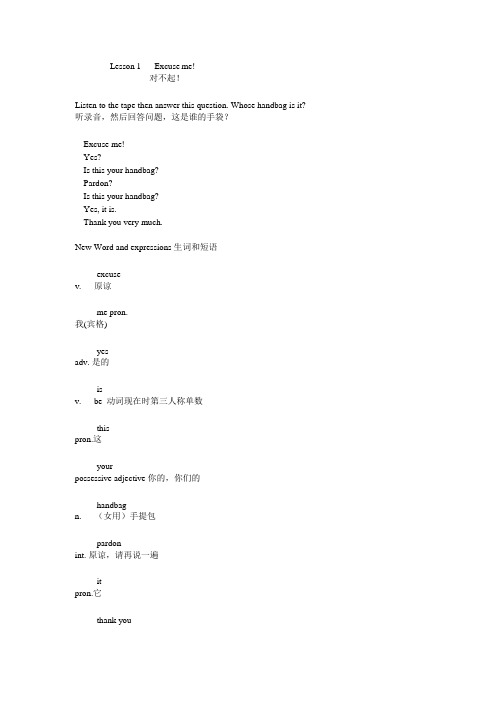
Lesson 1 Excuse me!对不起!Listen to the tape then answer this question. Whose handbag is it? 听录音,然后回答问题,这是谁的手袋?Excuse me!Yes?Is this your handbag?Pardon?Is this your handbag?Yes, it is.Thank you very much.New Word and expressions 生词和短语excusev. 原谅me pron.我(宾格)yesadv. 是的isv. be 动词现在时第三人称单数thispron.这yourpossessive adjective 你的,你们的handbagn. (女用)手提包pardonint. 原谅,请再说一遍itpron.它thank you感谢你(们)very much非常地参考译文对不起什么事?这是您的手提包吗?对不起,请再说一遍。
这是您的手提包吗?是的,是我的。
非常感谢!Lesson 3 Sorry, sir.对不起,先生。
Listen to the tape then answer this question.听录音,然后回答问题。
这位男士有没有要回他的雨伞?My coat and my umbrella please.Here is my ticket.Thank you, sir.Number five.Here's your umbrella and your coat.This is not my umbrella.Sorry sir.Is this your umbrella?No, it isn't.Is this it?Yes, it is.Thank you very much.New words and Expressions 生词和短语umbrellan. 伞pleaseint. 请hereadv. 这里mypossessive adjective 我的ticketn. 票numbern. 号码fivenum. 五sorryadj. 对不起的sirn. 先生cloakroomn. 衣帽存放处参考译文请把我的大衣和伞拿给我。
新概念英语第1册课文+译文

朗格教育高效英语学习中心新概念英语第1册英汉互译Lesson 1 Excuse me1excuse2我3是的 4 v.be动词现在时第三人称单数5your 6 (女用)手提包7pardon8它9感谢你(们)10 钢笔11 铅笔12 book13 watch 14 coat15 连衣裙16 skirt17衬衣18小汽车29 house1. 这是您的手提包吗?2.对不起! 什么事?3.是的,是我的4.这是您的手提包吗?5.这是您的手提包吗?6.非常感谢!7.对不起,请再说一遍?Lesson 3 Sorry, sir.1伞 2 please3这里 4 my 5 票 6 number 7 五8 对不起的9 sir 10 衣帽存放处11一套衣服12 school13 老师14 son 15 女儿1.这是我(寄存东西)的牌子。
2.是5号。
3.这是您的伞和大衣4.这不是我的伞5.对不起,先生。
6.这把伞是您的吗?7.不,不是!8.请把我的大衣和伞拿给我。
9.这把是吗?10.是,是这把11.非常感谢。
12.谢谢,先生Lesson 5 Nice to meet you1 先生2 好3 morning4 Miss5 新的6 学生7 French 8 German9 美好的10 遇见11 日本人12 Korean 13 中国人14 ad.也15(产品的)牌号16 Swedish 17 English 18 American 19 Italian 20Volvo 21标致22Mercedes 23丰田24 Daewoo 25 迷你26 福特27 Fiat1.这位是索菲娅.杜邦小姐。
2.索菲娅,这位是汉斯。
他是德国人。
3.这位是直子。
她是日本人。
4.索菲娅是个新学生。
她是法国人。
5.这位是昌宇。
他是韩国人。
6.很高兴见到你。
7.这位是鲁明。
他是中国人。
8.早上好,布莱克先生9. 这位是晓惠。
她也是中国人。
Lesson 7 Are you a teacher?1 I2 动词现在时第一人称单数3 动词现在时复数4 name5 what6 nationality7 工作8 电脑键盘9 operator10 工程师11 policeman 12 女警察13 出租汽车司机14 空中小姐15 邮递员16 护士17 机械师18 理发师1朗格教育高效英语学习中心19 家庭妇女20 送牛奶的人1你是做什么工作的? 2.很高兴见到你。
- 1、下载文档前请自行甄别文档内容的完整性,平台不提供额外的编辑、内容补充、找答案等附加服务。
- 2、"仅部分预览"的文档,不可在线预览部分如存在完整性等问题,可反馈申请退款(可完整预览的文档不适用该条件!)。
- 3、如文档侵犯您的权益,请联系客服反馈,我们会尽快为您处理(人工客服工作时间:9:00-18:30)。
millionaire n.百万富翁
retire vt.退休
pure a.纯的
temperature n.温度
picture n.图画,照片
future a.将来的,未来的
case n.箱,柜,盒,情况
bookcase n.书橱
June n.F月
ripe a.熟的,成熟的
hope vt.希望
envelope n.信封
type vt.&vi.打字
fare n.车(船)费,旅客票价
square n.广场,正方形
here ad.在这里,向这里
where ad.在哪里
some a.若干的,多少的
aeroplane n.飞机
medicine n.药
fine a.好的
shine vi.照耀,发光
wine n.葡萄酒,果子酒,酒
magazine n.杂志
bone n.骨头
someone pro.有人,某人
telephone n.电话,电话机
stupid a.愚笨的
Madrid n.马德里(西班牙首都)
mild a.温和的,温暖的
old a.老的,旧的
cold a.冷的,冷淡; n.冷
world n.世界
see the world 见见世面
husband n.丈夫
England n.英格兰,英国
those a. pro.那些
whose pro.谁的
lose vt.遗失
lose vt.遗失
nurse n.护士
of course 当然
because conj.因为
excuse v.原谅;n.原谅,辩解
amuse vt.娱乐,使...喜欢
rich a.油腻的,味浓的
French a.法国人的,法国的
lunch n.午餐,午饭
March n.Q月
torch n.火炬,手电筒,火把
What a nuisance!真讨厌
come out of... 由...出来
not...but... 不是...而是...
Mr. n.先生
Mrs. n.夫人
What's up? 干什么?忙什么?
America n.美国,美洲
Canada n.加拿大
idea n.思想,概念,主意
piece n.片,块
office n.办公室,营业所,公司
nice a.令人愉快的,和蔼的
choice a.精选的 n.挑选
voice n.声音,(讲话)声
price n.价格,价钱,价
advice n.忠告,建议
take advice 接受劝告
leave vt.,vi.离开,遗忘
have vt.有,知道;吃,喝
shave vi.刮脸
wave vi.挥手招呼 vt.挥动
believe vt.&vi.相信,认为
give vt.给,送给,授予
drive vt.,vi.驱使,驾车
arrive vi.到达(某地)
boiling a.沸腾的
evening n.傍晚,晚间;晚会
morning n.早晨,上午
shopping n.购物
bring vt.带来,拿来
spring n.春,春季
during prep.在...期间
exciting a.令人兴奋的
handwriting n.笔迹,书写,书法
charge vt.罚款,指控
large a.大的,巨大的
stomach-ache n.胃痛
ear-ache n.耳痛
headache n.头痛
toothache n.牙痛
tie n.领带
cake n.饼,糕,蛋糕,点心
make n.(产品)来源 vt.制造
wife n.妻子
housewife n.家庭主妇
cabbage n.卷心菜
village n.村,村庄,乡村
garage n.汽车修理厂,车库
bridge n.桥,桥梁
change n.零钱;变化,交换
orange a.橘黄色的 n.橘子
interesting a.有趣的,有意思的
long a.长的
along prep.沿着
belong vi.属于,归(某人)所有
wrong a.错误的,不适当的
young a.年轻的
dog n.狗
peach n.桃
which a.&pro.哪一(个)
suitcase n.小提箱
please vi.请
vase n.花瓶
cheese n.干酪,乳酪
Japanese n.日本人 a.日本的
Chinese n.中国人,中文,汉语
noise n.闹声,噪音,声响
rise vi.上升,站起
surprise n.惊奇,意外事
spend vt.度过,花费(钱等)
find vt.找到,发现
behind prep.在...后面
make up one's mind 决定,决心
pound n.磅
surround vt.包围,环绕
good a.好的
wood n.树林,木质,木材
Holland n.荷兰
Finland n.芬兰
Poland n.波兰
Scotland n.苏格兰(英国)
stand vi.&vt.站立;持久
understand vt.,vi.了解,理解
week-end n.周末
friend n.朋友
depend 依靠
favourite a.特别喜爱的
opposite a.对面的
invite vt.邀请
note n.纸币,备忘录,记录
cigarette n.香(纸,卷)烟
minute n.分(钟),瞬间
tongue n.舌,语言
blue a.蓝色的
glue n.胶水,胶 v.用胶粘
bed n.床
make the bed 铺床
need vt.需要
speed n.速度
middle-aged a.中年的
get married 结婚
red a.红的,红色的
tired aቤተ መጻሕፍቲ ባይዱ疲乏,累
embarrassed a.窘迫,尴尬
afraid a.害怕的
France n.法国
insurance n.保险
nuisance n.讨厌的人或事物
licence n.许可,特许,执照
intelligence n.智力,理解力
pence n.便士(英货币)
mince n.绞肉,肉馅
since conj.自...以来,既然
electric a.电的
bad a.坏的,恶的,严重的
dad n.爸爸
read vt.&vi.阅读,读
bread n.面包
instead ad.代替,顶替
abroad ad.到(在)国外
pad n.衬垫,信笺簿
sad a.悲哀的,糟透的
introduce vt.介绍
lettuce n.莴苣
lemonade n.柠檬水
beside prep.在...旁边
coffee n.咖啡
black coffee 清咖啡
tree n.树木
see vi.&vt.看见
employee n.雇员
knife n.刀子,小刀
beg vt.请求,乞求 vi.行乞
egg n.蛋,鸡蛋
big a.大的
building n.建筑物,大楼
nothing n.&ad.没有什么东西
anything n.&pro.无论什么东西
everything pro.一切事物
king n.国王,大王
expensive a.昂贵的,耗费巨大的
move vi.,vt.搬迁,移动
serve vt.&vi.侍候(顾客)
goodbye int.再会,再见
recognize vt.认出,认识,承认
size n.大小,尺寸,尺码
loaf n.块,片,条
beef n.牛肉
thief n.贼,窃贼,小偷
off prep.,ad.,a.离开
take off 脱掉
turn off 关上(电灯等)
half a.一半的
shelf n.搁板,架子
enjoy oneself 过得快乐
bag n.袋,提包,枕套
handbag n.手提包(女用)
apple n.苹果
kettle n.水壶
little a.小的,年轻的
bottle n.瓶子
name n.名字
same a.同样的
time n.时间,时刻,时光
have a good time 玩得开心
come vi.来
Rome n.罗马(意大利首都)
take vt.,vi.拿,捉;占领
overtake vt.追上
mistake n.错误,过失,误会
like vt.喜欢,爱好
